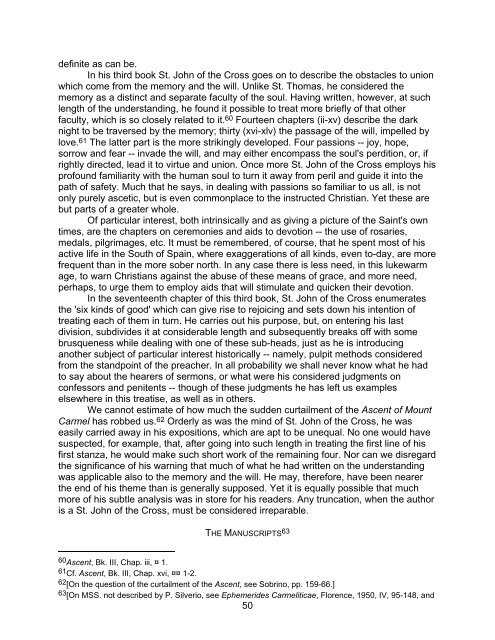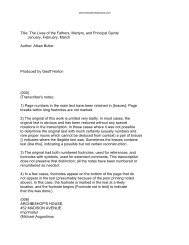Ascent of Mt. Carmel - St. Patrick's Basilica
Ascent of Mt. Carmel - St. Patrick's Basilica
Ascent of Mt. Carmel - St. Patrick's Basilica
Create successful ePaper yourself
Turn your PDF publications into a flip-book with our unique Google optimized e-Paper software.
definite as can be.<br />
In his third book <strong>St</strong>. John <strong>of</strong> the Cross goes on to describe the obstacles to union<br />
which come from the memory and the will. Unlike <strong>St</strong>. Thomas, he considered the<br />
memory as a distinct and separate faculty <strong>of</strong> the soul. Having written, however, at such<br />
length <strong>of</strong> the understanding, he found it possible to treat more briefly <strong>of</strong> that other<br />
faculty, which is so closely related to it. 60 Fourteen chapters (ii-xv) describe the dark<br />
night to be traversed by the memory; thirty (xvi-xlv) the passage <strong>of</strong> the will, impelled by<br />
love. 61 The latter part is the more strikingly developed. Four passions -- joy, hope,<br />
sorrow and fear -- invade the will, and may either encompass the soul's perdition, or, if<br />
rightly directed, lead it to virtue and union. Once more <strong>St</strong>. John <strong>of</strong> the Cross employs his<br />
pr<strong>of</strong>ound familiarity with the human soul to turn it away from peril and guide it into the<br />
path <strong>of</strong> safety. Much that he says, in dealing with passions so familiar to us all, is not<br />
only purely ascetic, but is even commonplace to the instructed Christian. Yet these are<br />
but parts <strong>of</strong> a greater whole.<br />
Of particular interest, both intrinsically and as giving a picture <strong>of</strong> the Saint's own<br />
times, are the chapters on ceremonies and aids to devotion -- the use <strong>of</strong> rosaries,<br />
medals, pilgrimages, etc. It must be remembered, <strong>of</strong> course, that he spent most <strong>of</strong> his<br />
active life in the South <strong>of</strong> Spain, where exaggerations <strong>of</strong> all kinds, even to-day, are more<br />
frequent than in the more sober north. In any case there is less need, in this lukewarm<br />
age, to warn Christians against the abuse <strong>of</strong> these means <strong>of</strong> grace, and more need,<br />
perhaps, to urge them to employ aids that will stimulate and quicken their devotion.<br />
In the seventeenth chapter <strong>of</strong> this third book, <strong>St</strong>. John <strong>of</strong> the Cross enumerates<br />
the 'six kinds <strong>of</strong> good' which can give rise to rejoicing and sets down his intention <strong>of</strong><br />
treating each <strong>of</strong> them in turn. He carries out his purpose, but, on entering his last<br />
division, subdivides it at considerable length and subsequently breaks <strong>of</strong>f with some<br />
brusqueness while dealing with one <strong>of</strong> these sub-heads, just as he is introducing<br />
another subject <strong>of</strong> particular interest historically -- namely, pulpit methods considered<br />
from the standpoint <strong>of</strong> the preacher. In all probability we shall never know what he had<br />
to say about the hearers <strong>of</strong> sermons, or what were his considered judgments on<br />
confessors and penitents -- though <strong>of</strong> these judgments he has left us examples<br />
elsewhere in this treatise, as well as in others.<br />
We cannot estimate <strong>of</strong> how much the sudden curtailment <strong>of</strong> the <strong>Ascent</strong> <strong>of</strong> Mount<br />
<strong>Carmel</strong> has robbed us. 62 Orderly as was the mind <strong>of</strong> <strong>St</strong>. John <strong>of</strong> the Cross, he was<br />
easily carried away in his expositions, which are apt to be unequal. No one would have<br />
suspected, for example, that, after going into such length in treating the first line <strong>of</strong> his<br />
first stanza, he would make such short work <strong>of</strong> the remaining four. Nor can we disregard<br />
the significance <strong>of</strong> his warning that much <strong>of</strong> what he had written on the understanding<br />
was applicable also to the memory and the will. He may, therefore, have been nearer<br />
the end <strong>of</strong> his theme than is generally supposed. Yet it is equally possible that much<br />
more <strong>of</strong> his subtle analysis was in store for his readers. Any truncation, when the author<br />
is a <strong>St</strong>. John <strong>of</strong> the Cross, must be considered irreparable.<br />
THE MANUSCRIPTS 63<br />
60<strong>Ascent</strong>, Bk. III, Chap. iii, ¤ 1.<br />
61Cf. <strong>Ascent</strong>, Bk. III, Chap. xvi, ¤¤ 1-2.<br />
62 [On the question <strong>of</strong> the curtailment <strong>of</strong> the <strong>Ascent</strong>, see Sobrino, pp. 159-66.]<br />
63 [On MSS. not described by P. Silverio, see Ephemerides <strong>Carmel</strong>iticae, Florence, 1950, IV, 95-148, and<br />
50






